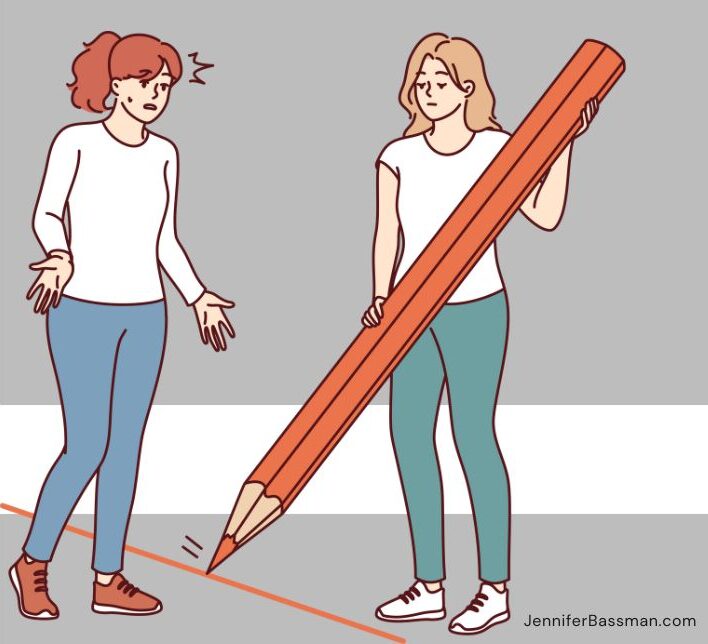About a month ago, I lost my sh!t on someone that, well, they deserved it.
I’d finally decided that it didn’t matter anymore what I said or how I said it. Ultimately, when this person has to explain their role or provide necessary details in a difficult or complicated situation, I will always be wrong and a complete pain in their ass.
I have been approaching this person and situation for years in a calm and polite manner. Tiptoeing.
Purposely using an even tone, neutral body language, and carefully chosen words.
I have read entire books on how to approach and discuss difficult and complicated situations with people that are reactive.
In the past, I learned that if I’m direct, ask for what I actually want or need, and/or ask questions they don’t want to answer – I risk the reaction of being called a b*tch.
Or being told to stop “yelling.”
Or being told to “stop being difficult.”
In the past, I usually felt guilty or blamed myself for their reaction. I just hadn’t learned how to communicate or was making “b*tchy” facial expressions. (I admit I do have impressive Resting Bitch Face that I’m not always mindful of.)
Basically, I’d made them uncomfortable or asked for too much.
Apparently, I can’t even be angry right. I’d end up writing an email or text apologizing for making them uncomfortable and let them off the hook for providing any necessary information. Not to worry, “I would figure it out.”
This has led to years and years of resentment. And therapy. So, I finally had enough and lost my sh!t.
Did I end up getting what I want? YEP.
Manage your anger and the stress it causes you with my Stress Management for Women workbook. Click here to download it now!
Why Did That Have to Happen?
Here’s my theory: In this person’s eyes, I have always been a nice, calm, and accommodating woman that knew my place. It was easy to take advantage of my people-pleasing nature. This person knew I would bend until I broke or take responsibility for everything out of fear.
Clearly, I didn’t respect myself or think I deserved to be treated better.
Confucius was right about the whole “respect yourself and others will respect you” thing, but what he didn’t account for is getting called a b*tch when you do.
Does any of this sound familiar?
It’s not just you and me — this double standard around women’s anger is baked into the cultural fabric. Google “angry woman humor” and it’s meme after meme about women being irrationally angry and men having no idea why.
We’re taught from a young age to smile, be nice, and keep our emotions in check. Meanwhile, anger — a totally normal, healthy emotion — gets treated like some sort of moral failing if it’s coming from a woman.
The Saintly Trap: Why Women Suppress Anger
Where does this idea that women need to be perpetually agreeable come from?
Historically, women were praised for being nurturing, selfless, and calm — a.k.a. not angry. Anger was seen as unfeminine, unattractive, and downright threatening. (To men.)
Fast forward to today, and the pressure to be nice is alive and well from both men and women. Women are often expected to absorb other people’s needs and emotions while minimizing their own. And heaven forbid we express frustration, set boundaries, or (gasp!) raise our voices — because then we’ve crossed into “b*tch territory.”
The result? We suppress our anger. We bottle it up, slap a smile on, and internalize the message that our emotions are “too much” or we are “being dramatic.”
But guess what happens to all that suppressed anger? It doesn’t just evaporate. It festers. And eventually, it explodes.
The Shame Spiral: Women and Emotional Suppression
When that explosion happens, the aftermath can feel brutal. Not only do we have to deal with the fallout of whatever we’ve said or done, but we’re also hit with a wave of shame. “Why did I let myself lose control? I look so irrational. Everyone must think I’m a b*tch.” (For the record, I think you’re a badass.)
Here’s the kicker: That shame doesn’t come out of nowhere.
It’s a byproduct of the cultural narrative that anger is unladylike. And because society rarely makes space for women’s anger, we’re left to navigate these emotions in isolation, wondering if we’re the problem.
Spoiler alert: We’re not the problem. The problem is a system that tells us to stay silent, accommodating, and has taught men to make jokes about our menstrual cycles — until we snap.
And then it punishes us for snapping. (And having periods.)
It’s a no-win situation.
Anger Is Not the Enemy: Reclaiming Women’s Emotions
Let’s be clear: Anger isn’t the villain of this story. In fact, anger is one of the most powerful tools we have. It’s a signal that something isn’t right, that our boundaries have been crossed, or that we’re being treated unfairly.
Anger is a call to action.
Think about the times you’ve gotten really angry. Was it because someone dismissed your feelings? Took you for granted? Piled on one more responsibility you didn’t have room for? Left napkins out of your to-go order?
That anger wasn’t random. It was pointing you toward something that needed to change.
The problem isn’t anger itself — it’s how we’ve been conditioned to suppress it, deny it, or feel guilty for it. When we treat anger as something shameful, we’re missing out on its potential to create change, set boundaries, and protect our well-being.
(Note to men: stop mislabeling women’s anger. If a woman is upset, she’s not a b*tch. There’s a real problem that needs a solution. Don’t crack jokes, be condescending, or hide.)
Reclaiming Your Anger: Turning Emotions Into Action
So, how do we break free from the Saint-to-“B*tch” Trap?
It starts with unlearning the belief that anger is bad and learning to use it as a tool for growth. Here’s how:
- Recognize Anger as a Signal: Instead of dismissing your anger, get curious about it. What’s it trying to tell you? Are you overcommitted? Is someone violating your boundaries? Use your anger as a flashlight to shine a light on the real issue.
- Express It Early: The longer you bottle-up anger, the more explosive it becomes. Practice expressing frustration or setting boundaries as soon as you feel something’s off. Think of it as releasing steam from a pressure cooker before it blows.
- Ditch the Apologies: Stop apologizing for your emotions. Anger is valid. You don’t need to soften it with “I’m sorry, but…” Instead, try “I’m frustrated because…” Own your feelings without guilt.
- Reframe the Narrative: Remind yourself (and anyone who needs to hear it) that expressing anger doesn’t make you a “b*tch” — it makes you a human being. Start viewing anger as an ally, not an enemy.
- Channel It Productively: Use your anger as fuel for action. Whether that means having a tough conversation, setting a firm boundary, or changing a situation entirely, let your anger propel you forward instead of holding you back.
From “Too Much” to Just Enough
Here’s the truth: You’re going to make people uncomfortable when you express anger. And that’s okay. Their discomfort is not your responsibility. What is your responsibility is honoring your emotions, advocating for your needs, and rejecting the narrative that your anger is something to be ashamed of.
So, the next time you feel your blood boiling, don’t silence it.
Listen to it.
Use it.
And if anyone calls you a “b*tch” for standing up for yourself or asking for what you need? Well, you can smile sweetly and say, “Thank you.”






